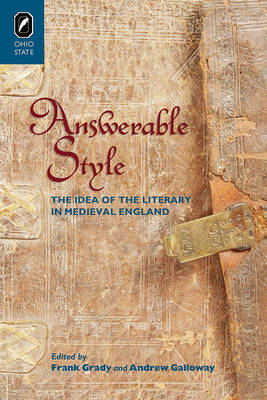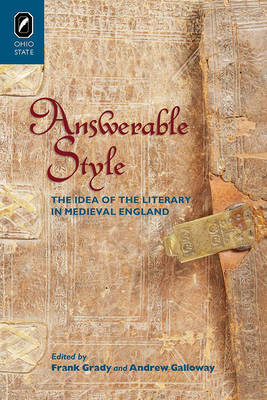
- Afhalen na 1 uur in een winkel met voorraad
- Gratis thuislevering in België vanaf € 30
- Ruim aanbod met 7 miljoen producten
- Afhalen na 1 uur in een winkel met voorraad
- Gratis thuislevering in België vanaf € 30
- Ruim aanbod met 7 miljoen producten
Zoeken
Answerable Style
The Idea of the Literary in Medieval England
€ 60,95
+ 121 punten
Omschrijving
Renewed interest in aesthetics, in form, and the idea of the literary has led some scholars to announce the arrival of a "new formalism," but the provisional histories of such a critical rebirth tend to begin well after the beginning, paying scant attention to medieval literary scholarship, much less the Middle Ages. The essays in Answerable Style: The Idea of the Literary in Medieval England offer a collective rebuke to the assumption that any such aesthetic turn can succeed without careful attention to the history and criticism of "the medieval literary." Taking as their touchstone the influential work of Anne Middleton, whose searching explorations of the dialectical intersection of form and history in Middle English writing lie at the heart of the medievalist's literary critical enterprise, the essays in this volume address the medieval idea of the literary, with special focus on the poetry of Chaucer, Langland, and Gower. The essays, by a notable array of medievalists, range from the "contact zones" between clerical culture and vernacular writing, to manuscript study and its effects on the modalities of "persona" and voicing, to the history of emotion as a basis for new literary ideals, to the reshapings of the genre of tragedy in response to late-medieval visions of history, and finally to the relations between poets writing in different medieval vernaculars. With this unusually broad yet thematically complementary set of essays, Answerable Style offers a set of key critical and historical reference points for questions currently preoccupying literary study.
Specificaties
Betrokkenen
- Uitgeverij:
Inhoud
- Aantal bladzijden:
- 352
- Taal:
- Engels
- Reeks:
Eigenschappen
- Productcode (EAN):
- 9780814256329
- Verschijningsdatum:
- 9/10/2020
- Uitvoering:
- Paperback
- Formaat:
- Trade paperback (VS)
- Afmetingen:
- 152 mm x 229 mm
- Gewicht:
- 517 g

Alleen bij Standaard Boekhandel
+ 121 punten op je klantenkaart van Standaard Boekhandel
Beoordelingen
We publiceren alleen reviews die voldoen aan de voorwaarden voor reviews. Bekijk onze voorwaarden voor reviews.










